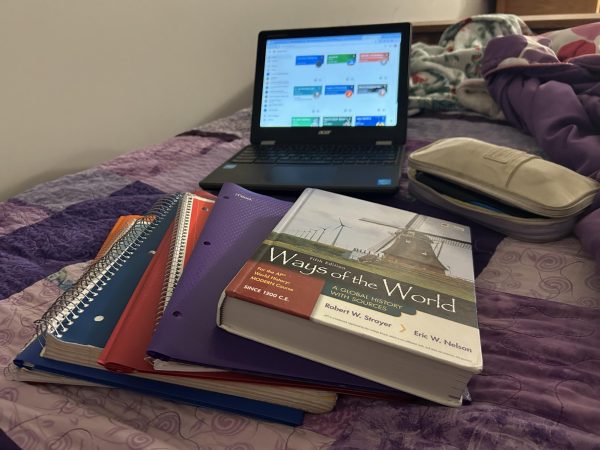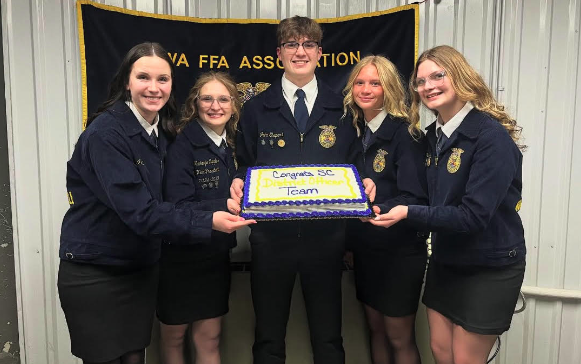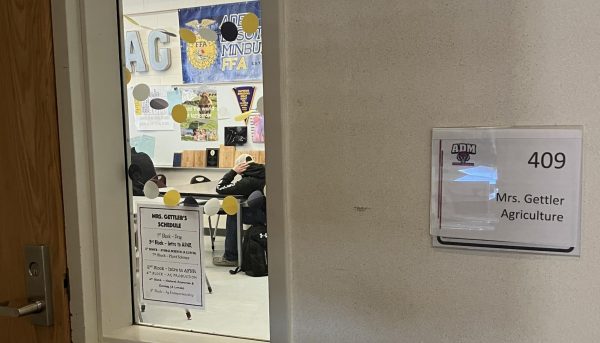Joni Ernst Coming to ADM: Getting to Know an Iowa Senator
On March 29, ADM High School was visited by Joni Ernst, Junior Senator of the State of Iowa, who was elected 2014. She grew up in southwest Iowa in a farmer family with a sister and a brother. She graduated from Iowa State University and has been on active military duty for 27 years. She also has served for four Committees in the US government. Ernst joined the army to serve the country and to give back to the USA. She retired last November from the Iowa Army National Guard and visited ADM for a short speech and Q&A with students.
Student: Do you support candidates that are still in race today?
Ernst: Yes, of course, I do. I am an eternal optimist and we started with seventeen candidates and it has narrowed down quickly, down to three so we do still have Cruz, we have Trump, we have Kasich and I have met all three and there are big differences between all three but I have stated that i will remain neutral in the race and then when we have a nominee coming out of our convention in mid-July then I will happily support that candidate because I believe that most of what they have proposed, everyone has a few differences, but we all tend to agree more with the GOP stance, then of course, someone on the Democratic platform.
Student: Do you support the minimum wage?
Ernst: I’m not opposed to the minimum wage. I am okay with a Federal minimum wage. We have one right now, but what I believe is important is that the minimum wage is set by individual states. I don’t think that the Federal Government should say that it’s 15 dollars. Like I said, in California, the cost of living is higher than what we have here in Iowa. You may pay 1500 dollars rent for a single room apartment in California, but in Iowa 1500 dollars a month is twice my mortgage payment. So with different economies across the United States, it is important for the governments of these states to decide what is right for their state economies.
Student: Do you support Senator Chuck Grassley in his decision to not have hearings in the US Senate Supreme Court Obama’s Nominee?
Ernst: I do support him on that. We’ve had some very divisive elections, we elected Obama for 4 years and that happened but we have had a very big change in the Senate. We elected 12 brand-new freshman republican Senators in the last election season, which speaks very clearly that people are upset with what Obama is doing right now, but because it is the Senate that will make that decision, Senator Grassley has decided to not have hearings and I’ll support him on this decision. Now it’s important to understand that with eight justices on the Supreme Court they are still hearing cases just as they always have. Legislature actually says the number of justices on the supreme court years ago used to be six. Now we have eight. We have a vacancy but we will fill it eventually and we will see who the next president is: Republican or Democrat. Voters will make that choice and I will follow Senator Chuck Grassley. He is the chair of the judiciary. I am not on the judiciary committee. I remain focused on the work that I do in my office.
Student: Are you pro-GMO?
Ernst: I am pro-GMO. I think most Iowans do tend to be pro-GMO, and that is definitely about feeding and fueling the world. We have so much research and development here in Iowa that has really advanced us, really above many of our competitors. We are able to create more food stock for for the world, because we have GMO’s, and that is really important. Going back to GMO labeling for just a second, recently Vermont passed a state law that would require labeling for food products that would require it to be disclosed on the packaging that there are GMO’s and other things, and of course they excluded a few things that were maybe raised in Vermont, so it’s not a very friendly state law. They passed this one law, and now every food item that is going into Vermont will have to be tracked and specially labelled. Now, what if Connecticut passed a labeling law that is different from Vermont’s, so now there are two individual labels. Then eventually every state could have it’s own labeling requirements, and then they would be producing 50 different labels for 50 different states, which would cause the cost of making food to increase. There have been studies done that estimate that there will be families that lose an extra 1,500 dollars in their food budget just because of this one Vermont law. In Montgomery County, I’ll use my county for example, and my county is a little different than your county, I’m not sure what your median household income is, but in Montgomery County, we are from an economically challenged area. Our median household income is 44,000 dollars a year for an entire family. Think about adding an additional 1,500 dollars to their budget, when they’re already straining, just because of Vermont’s special labeling law. So in the Senate, we tried to pass a universal labeling law, so all states would have common standards. Unfortunately, that law was overturned, so the United States Senate will have to go back and rework that language. In the meantime, people in every other state in the United states will have to pay more, because of what Vermont wanted to do.
Student: Do you think Hillary should be indicted for the email scandal?
Ernst: I will leave that opportunity up to the FBI and the department of justice, but I will tell you that if it had been me that had communicated private information from that private server, there’s no question where I would be. Personal opinion, but she should know that.
Student: What can we do to make college more affordable?
Ernst: I think we need to take a look at those universities and those schools, and make sure what they’re charging is appropriate for those types of degrees and the quality of education that’s coming out. But then those that are taking student loans out at the very lowest interest rate, and maybe allowing them to adjust that later on. Look at the amount of people who are coming out of college with an overwhelming amount of debt, and that’s bad. We want everyone coming out of college to get established and get a job. An affordable rate of payment for student loans is important, because without that, you’re not apt to buy a house, you’re not apt to by a car, because of that, and we want you to invest in your communities. We need to be able to refinance loans to make them payable. But focusing back on our colleges and universities, we need to make sure that it is quality education at an affordable rate. We’ve heard a lot about free college, but my question back is, “what’s free?” Are the teachers donating their time? Is the electric bill being written off by the electric company? So instead of having outstanding student debt, there would be higher taxes in the place of student debt.







